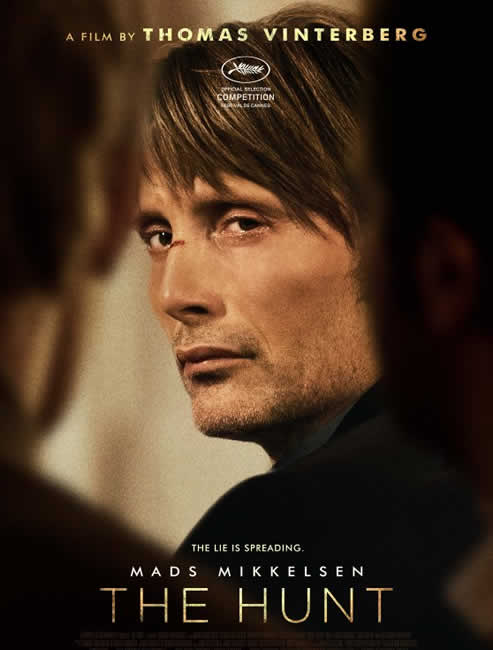 Thomas Vinterberg’s harrowing drama “The Hunt” (“Jagten”), is one of two must see post-Dogme films currently in theatres
Thomas Vinterberg’s harrowing drama “The Hunt” (“Jagten”), is one of two must see post-Dogme films currently in theatres
Mads Mikkelsen, who won the Cannes Best actor award for his role, is breathtaking as the caring kindergarten teacher whose life is shattered by a child’s thoughtless accusation.
A cross between the the McMartin preschool trial and Ibsen’s “An Enemy Of The People” (itself written to protest the furor his play “Ghosts” aroused) Tobias Lindholm (“Submarino”) and Thomas Vinterberg (“A Celebration”) script is a crafty thing, sensitive and infuriating in turn. “A Celebration” and like that career-making film, it digs under the surface of a tight knit community to reveal the sad underbelly of friendship, love and trust.
Far more affecting than Haneke’s overrated “Amour”, the straight ahead film, wastes no time making its point.
Schoolteacher Lucas (Mikkelson) is is divorced, and fighting to spend time with his estranged son Marcus (Lasse Fogelstrom). His school has closed but he’s adapting to in his new role as a kindergarten teacher. Kindly and playful, he’s a warm older brother or father figure and the kids adore him. He’s even beginning a romance with a lovely immigrant co-worker (Alexandra Rapaport)
I was mad about Mikkelson’s performance in Susanne Bier’s brilliant Dogme-atic “After The Wedding” (2008). This performance is even more impressive. He’s in every scene. Lucas’s best friend Theo (Thomas Bo Larsen) and Agnes (Anne Louise Hassing) are constantly frightening, and their youngest Klara (Annika Wedderkopp) can’t seem to get their attention. Lucas steps in and walks her to school, helping her with an OCDC issue, the troubled girl is nursing.
Klara develops a major crush on her father stand in. (There’s even an odd moment late in the film when she mistakes them at the door of her room.)
At first, their relationship charms us. It’s a friendship we haven’t seen on screen before. But after Klara tries to kiss him on the mouth, Lucas rebuffs her. She’s anxious; she’s losing another parental figure. Her older brother Torsten (Sebastian Bull Sarning.) and his friend expose her to an image of online pornography, and the confused girl says something to her teacher that begins to sound like an accusation. To her credit, she tries repeatedly to withdraw the accusation, but the machinery of adult indignation and fear begins to run, and Lucas’s life is shattered.
It’s a slippery slope from a PC attempt to do the right thing, to the rampant righteous outrage that drives the community’s parents, condemning Lucas without questioning. The meddling small town school counselor Ole (Bjarne Henriksen) and Lucas’s director Grethe (Susse Wold) tell him nothing, so he is unable to clear his name.
Lucas is left with one loyal friend l (Lars Ranthe), who’s darkly comic philosophy is a comfort to the unbelieving scapegoat and a support to Marcus once he begins to fight for his father’s honor.
As in the lengthy trial that demonized the McMartin family who were later exonerated, Lucas is found innocent, but at the price of the uprooting of his entire life.
Through a psychological strip tease, told mostly in looks and body language, Lucas goes from “hale fellow well met”, life of the party and his hunt buddies’s golden boy, to a man with nothing left to believe in. His chiseled face, registering half tones of disbelief, at war with his natural compassion, reassembles a Käthe Kollwitz woodcut.
Mikkelen’s organic understated performance, a delicate layered thing, is so masterful that he holds his own against a luminous pintsize scene-stealer.
In a remarkable performance, Annika Wedderkopp, shows us all the corners of an ignored little girl, with a tender heart and no current focus for her affection. We understand her bungled attempt to get her own back by tattling, the loss of innocence she stumbles through, as the fulcrum for a communities outrage, her frustration with the chaos the adults around her produce and her relief to return to a simple friendship with her true friend Lucas.
Sadly, Vinterberg shows us children are not as innocent as we assume, and are prey to the same lock step projections and accusations that their parents participated in.
As in Tobias Lindholm’s equally powerful thriller “A HIghjacking”, a handheld documentary shooting style, mixed with elegant wide-shots, create a searing intimacy. Every look, every unsaid remark is held in closeups. Eyes speak volumes, as the town slides down the slippery road to Witch Hunt territory. The last scene is a quiet shocker.
Foursquare realism, and a story from recent headlines, fuel each of these films, and both are riveting..
It’s the naturalism that makes the film so horrifying. Nikolaj Egelund’s delicate score is used with a light touch, never pushing emotions, but adding a subtle background ambiance, like weather.
D.P. Charlotte Bruus Christensen’s beautiful wide screen compositions welcome us to the convivial community, and dispassionately record it’s hysterical melt down.
At the heart of the film is an unexpected friendship between a compassionate man and a young girl about to see the consequences of her active imagination.
Editor Janus Billeskov Jansen (” Pelle the Conqueror”, “Smilla’s Sense of Snow”), D.P. Charlotte Bruus Christensen (“Hunky Dory”), production designer Torben Stig Nielsen (“Reconstruction” and Henrik Ruben Genz brilliant Noir-western genre-bending black comedy thriller “Terribly Happy”), set decorator Rasmus Balslev-Olesen (“Submarino”, “Terribly Happy”) and costumer Manon Rasmussen (“A Royal Affair”, “Melancholia”, “After the Wedding”) makes for an excellent, tight production package. One of the best films of the year.

